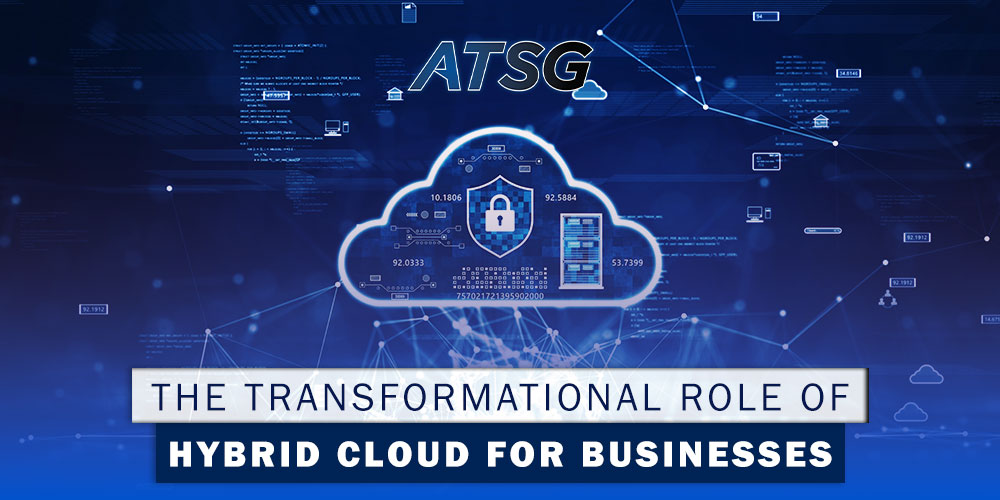If the post-pandemic world has taught us one thing, it is that there are numerous benefits and use cases of the Cloud, for modern businesses. By deploying Cloud Computing services and solutions, businesses can quickly get their hands on immense computing power and resources.
This diminishes the need to maintain and manage expensive hardware and IT infrastructure on-premise. That said, businesses that leverage the Cloud also need to be fully aware of the safety requirements and regulatory mandates for their valuable and sensitive data. Due to this, some businesses might hesitate, and would eventually miss out on leveraging the benefits of Cloud Computing.

This is where the significance of hybrid Cloud architectures comes in, offering unmatched flexibility and scalability to enterprises’ IT landscape. It gives businesses the choice to keep their mission-critical data and systems on-premise while modernizing their architecture strategies with public Cloud resources.
Read on to know more about the working of a Hybrid Cloud and the several ways it can really benefit your enterprise.
The Working of Hybrid Cloud Architecture
With Hybrid Cloud solutions, businesses can effectively allocate their resources by combining a Private Cloud environment with Public Cloud services. This leads to improved business flexibility, cost savings, and a seamless computing environment.
A major reason why a lot of businesses are leaning towards the Hybrid Cloud is that it gives companies a lot of control over their private data. This is particularly important today when intricate regulatory compliances continue to challenge businesses, across the globe.
For the successful deployment of a hybrid cloud strategy, it is crucial that the Public and Private Clouds are able to “seamlessly interact” with each other, which requires compatibility between the two. In many instances, the Private Cloud is designed in a way, that it becomes compatible with the Public Cloud solution.
For an effective Hybrid Cloud strategy, businesses must adopt the following mentioned steps.
- Carefully evaluate and plan their current infrastructure.
- Gauge the suitability of workloads for the Public Cloud.
- Take into consideration the security and compliance requirements mandated by the organization.
- Engage with a reliable managed services and technology solutions provider, like ATSG, that offers a comprehensive set of tools and services to effectively manage hybrid Cloud environments.
How Does the Hybrid Cloud Deliver Exponential Value?
In order to meet the IT infrastructure needs of today’s enterprise, the Hybrid Cloud is strategically well-positioned to deliver greater flexibility, security, scalability, and cost-efficiency for businesses.
Here are some points that emphasize the advantages of utilizing Hybrid Cloud solutions for enterprise IT infrastructures:-
- Hybrid Cloud solutions give businesses the chance to leverage the robust computational resources of the Public Cloud while keeping their sensitive and confidential data in local data centers.
- It also gives businesses freedom, in terms of leveraging new technology and processes, as businesses are no longer confined to their existing on-premise data centers. This results in better workload optimization and operational flexibility.
- Often, businesses’ computational power requirements keep fluctuating. With spikes and lows in resource demand, the scalability of hybrid Cloud solutions can be extremely beneficial. Through Hybrid Cloud solutions, the operational costs of deploying enterprises become a lot more manageable, as they can optimize their resources, in accordance with their needs.
- A Hybrid Cloud architecture can be useful for promising startups that initially lack the financial resources for a large in-house data center. It is also beneficial for established enterprises that require efficient and dynamic scaling of operations.
- Some industries have regulations that mandate the protection of private data, but not all data needs to be stored in a private environment. With a hybrid Cloud, companies can effectively comply with regulations, while also taking advantage of increased computational power.
- It also helps businesses deal with anomalies related to various workloads. For instance, certain applications may be running perfectly on-premise. However, the same app might require added computational power in the future. So, hybrid Cloud solutions work as a “failsafe”, to compensate for sudden spikes in workload requirements.
- Hybrid Cloud allows organizations to have a flexible storage framework. It also helps them overcome the challenges of a complex and fragmented data storage system. This allows enterprises to make better business decisions through efficient resource management, and access to useful insights as well as information from the organization’s overall data.
Hybrid Cloud enables organizations to avoid being tied to any single Cloud provider, commonly referred to as vendor lock-in. It gives them the freedom to choose the best resources for their needs.
Conclusion
Today’s macroeconomic pressures and uncertainties have propelled businesses to explore innovative solutions for their IT infrastructures. This is why the popularity of Hybrid Cloud solutions continues to gain momentum. They help businesses streamline their IT environments, and have a measurable cost structure, all through “the press of a button”.
With a Hybrid Cloud architecture, enterprises are no longer limited to any single environment approach. This way, businesses can avoid any sub-optimal trade-offs, which might cause inconvenience across any of their data realms.
Contact ATSG, to take advantage of its industry-leading Hybrid Cloud solutions, top-notch managed IT services, and intelligent technology solutions for your enterprise.
ATSG’s Hybrid Cloud and Transformation Services offer a comprehensive solution for organizations seeking guidance and management expertise for their multi-cloud operations.
ATSG offers customized and efficient Hybrid Cloud deployment and management services, which allow organizations to leverage the benefits of both Public and Private Cloud environments, in an effective and flexible manner.




